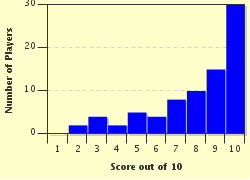Quiz Answer Key and Fun Facts
1. To begin in Danish, you'll need a basic vocab: "Yes" = "Ja", and J is said as Y in English; "No" = "Nej" - pronounced 'nigh', chopping short the ending. This question should be fairly easy, right?
2. If you intend to stay in Denmark for some length of time, you should learn such useful phrases as, "I love you!" How would you say that?
3. There is no one word for "Please" in Danish. It's more formal like "Vil du gerne...?" = "Will you kindly..." or "Vil du vaer soed..." is "Will you be sweet and..." I need some salt for my potatoes, so I say what?
4. I want to describe my house to you, so I first tell you the color and then the size, "Mit hus er roedt og meget lille." This explains that I live in a large green house.
5. Now I tell you I have a large kitchen and a small garden. Which choice is this?
6. "Vil du gerne se paa fjernsyn?" I have just asked if you would like to watch TV.
7. "Er du sulten?" can also be expressed, "Sulter du?" = "Are you hungry?" or "Do you hunger?"
"Husker du?" and "Kan du huske?" both mean "Do you remember?"
Let me ask, "Husker du hvad farve mit hus er?" And you would answer?
8. The Danes don't tell time the same as the British and some people use the 24 hour method. "Halv fem" {half five} = "4:30"
9. Your host is setting the table for 'smoerrebroed' {literally "Buttered Bread", and meaning the same but with all sorts of wonderful toppings, canape style}and it smells delicious! You think to yourself "Jeg er saa sulten jeg kunne spise en ko!" What does that mean?
10. "Klokken er halv to, og jeg skal i seng!" translates to what in English?
Source: Author
alexis722
This quiz was reviewed by FunTrivia editor
Bruyere before going online.
Any errors found in FunTrivia content are routinely corrected through our feedback system.

